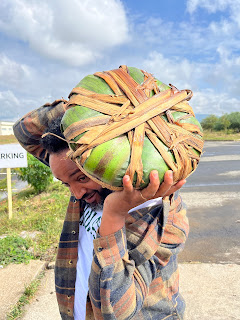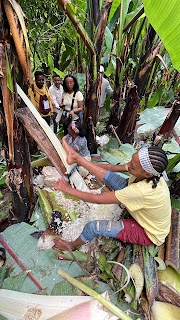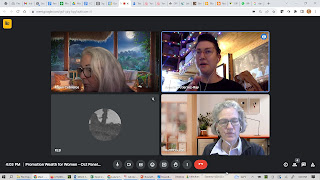Nov. 8, 2023
 |
| Moplaco representatives at IWCA reception: Axumawit, Heleanna, Aisha |
At the end of October I had the amazing opportunity to spend several days over the span of two weeks with leaders and staff of Moplaco Trading in Ethiopia. It is a remarkable company run by a team of remarkable people, (which is not surprising since great employees are the foundation of any company that achieves success.) The Moplaco staff is led by Heleanna Georgalis, who is a force in specialty Ethiopian coffee, and a wise and skilled international businesswoman.
One aspect that impressed me was Moplaco's unique advocacy for sustainability and resilience via their outspoken and clearly articulated statements on "the good" and "the bad" in Ethiopia's agro-forestry realm. I had expected cheers for Ethiopia's five UNESCO biospheres and promotions extolling the virtues of forest coffee, but Moplaco by-passes all that with two clear messages I have to admit I had not heard before:
1. Eucalyptus tree farming is bad for coffee, bad for coffee farmers and therefore bad for Ethiopia.
2. False banana is a "miracle tree" that is good for coffee, good for coffee farmers and should be encouraged in coffee areas where its virtues hold true.
Eucalyptus: I first heard Heleanna, Moplaco's CEO, mention the issue of coffee farmers switching from coffee to eucalyptus tree farming in a radio interview she gave to BBC in September 2023. She said her company had created and promoted a short animated video to try to galvanize and educate coffee farmers to resist the quick cash that eucalyptus promises, only to find out that the long term brings tragic loss of soil fertility for any and all crops, including the eucalyptus trees. I found the striking and well-made video on Moplaco's instagram feed. [Click to watch.] It got me on board.
The short and memorable video was played at the IWCA convention for the ~ 300 guests at the Skylight Hotel. I believe the reaction of most guests was the same as mine: "I didn't realize this was an issue." The next day during a small group discussion with Heleanna, she elaborated on the issue, sharing that the eucalyptus tree itself does not threaten long-term sustainabilty, it's the inability to manage a eucalyptus forest properly. Farmers are driven to over-plant by the promise of cash returns and buyers are not self-regulating their purchases.
Eucalyptus was introduced into Ethiopia around 1900 by the great Emperor Menelik II who was looking for a fast growing tree that could provide fire-wood for Addis Ababa’s fast growing population. It now infests most of the landscape of the country pushing out native species, poisoning the undergrowth, sucking up all the soil moisture and leaving the dehydrated ground exposed to the torrential rains which will then remove the top-soil and begin to dig ravines into the base clay. You can see it all over.
I got to see the eucalyptus threat with my own eyes during a short trip in the Sidamo region while driving to a coffee farm. The road went by acres of land cleared and left with eucalyptus stumps as far as the eye could see. Next to it, acre after acre of eucalyptus trees, waiting for harvest. In contrast, on the coffee farms in the mountains of Sidamo Nansebo, we walked through hills of healthy coffee trees growing organically under the shade of tall trees which have been there for hundreds of years. Coffee was also shaded by the "tree hero" - the false banana tree.
The False Banana, also known as Enset, is one of those wonders of nature where every part of it provides something the community needs. For example, I learned in grade school that eskimos use every part of a whale after it is caught. Nothing goes to waste. The same is true with the false banana, except it provides benefits during its life and "after", when it is cut down. While it grows, its roots hold together the soil and help to prevent erosion and its shade provides an ideal microclimate for coffee.
The false banana is a close relative of the banana, but is grown and consumed only in one part of Ethiopia. It's also found in Uganda and Philippines. It's taller and fatter than a banana tree and gives no bananas (which gives rise to its English language name “the false banana”). The lucky Ethiopians who know it, use it to make porridge and bread and have a huge advantage for food security. Research suggests the crop could be grown over a much larger range in Africa. "It's got some really unusual traits that make it absolutely unique as a crop," said researcher Dr James Borrell, of the Royal Botanic Gardens at Kew."You plant it at any time, you harvest it at any time and it's perennial."
The banana-like fruit of the plant is inedible, but the starchy stems and roots are fermented and used to make porridge and bread, called "Kocho" which I got to see and taste during my visit to the Nansebo coffee farm. After 4 - 6 months (!) of fermentation in the ground, the hearty food is wrapped in a false banana leaf and sold to eager customers who come to the farm gate to buy.
Why isn't the false banana tree spreading everywhere? At least part of the answer lies in culture. Kocho is seen as a “country food” even “backwards” or “primitive” by many Ethiopians. City people are inclined towards injera, the pancake like t’eff based common staple which is found across Ethiopia. T’eff is another indigenous, endemic crop, but has extremely low energy content, is labor intensive to produce and is not at all robust to droughts. Kocho on the other hand is disdained in the same way the English used to look down on potatoes as “Irish food.”
The enset plant is highly drought resistant. It is said to survive up to seven years without rain. [2] So what you have in a stand of Enset is a food bank that can last for 7 years!
But wait, there's more and it's coffee specific. Enset acts as a wet-nurse to help coffee grow. When it’s about a year old a coffee seedling is planted near the base of the Enset and it provides water to the coffee seedling. Enset is full of water and it shares with the coffee through a mycorrhizal association. In time, the coffee trees replace the false banana trees in parts of the field. Enset matures in about 3 years.
The coffee seedling will grow for 2 years in the shade of the enset. As it approaches fruit bearing age the Enset is removed. It can be used for food and fibre, fed to animals, moved and re-planted in another place or used to make seedlings. When the stump is buried in the ground again with a healthy feeding of manure under it, it explodes into a patch up to 50 little Enset seedlings!
"We need to diversify the plants we use globally as a species because all our eggs are in a very small basket at the moment," said Dr Borrell.
[1]https://www.bbc.com/news/science-environment-60074407
[2]https://www.permaculturenews.org/2010/11/04/enset-the-false-banana-gives-food-security-and-more/

















